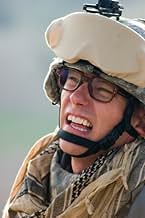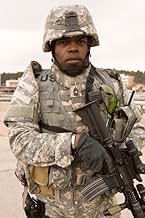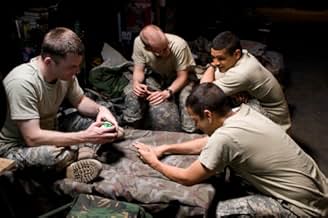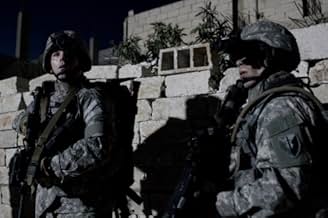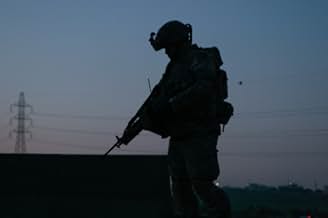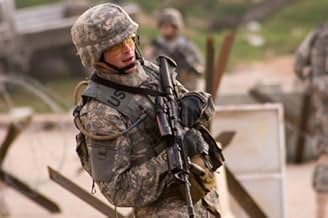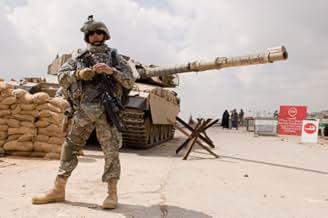IMDb-BEWERTUNG
6,1/10
11.547
IHRE BEWERTUNG
Die erschütternde Rekonstruktion der Vergewaltigung und Ermordung eines 15-jährigen irakischen Mädchens durch amerikanische Soldaten in Samarra im Jahr 2006.Die erschütternde Rekonstruktion der Vergewaltigung und Ermordung eines 15-jährigen irakischen Mädchens durch amerikanische Soldaten in Samarra im Jahr 2006.Die erschütternde Rekonstruktion der Vergewaltigung und Ermordung eines 15-jährigen irakischen Mädchens durch amerikanische Soldaten in Samarra im Jahr 2006.
- Auszeichnungen
- 6 Gewinne & 2 Nominierungen insgesamt
Anas Wellman
- Soldier
- (as Anas 'Tipsy' Wellman)
Happy Anderson
- Battalion Commander
- (as Eric 'Happy' Anderson)
- …
Empfohlene Bewertungen
10g.barlas
I've read all the reviews above...... The American ones are thumbing down the film; and the rest of the world giving thumbs up... I join the latter group.... A courageous film (not a movie!); says what it wants to say in an understandable, simple way and yet becomes very moving.... This is not a film for people from NYC or Texas (see the very first reviews above); let them go to see the Transformers or Jumper; who'd rather sit back with a half a gallon soda in one hand and bucket of popcorn in the other and enjoy mindless flicks.. Finally an American filmmaker came up with a thinking-man's film and he is to be congratulated.. This film should be prized and shown to every war-blind and ignorant American who still blindly support the invasion of Iraq. Of course it is not a perfect film (one can never make a perfect film over such a horrible story) but yet very moving and pushing one to think over the empty definitions of NeoCons over democracy, freedom; liberty and humanity... A companion piece to In the Valley of Elah, I should say, and very well done Mr DaPalma...
Brian de Palma's Redacted ups the ante of protest films, fictionally recounting the rape and murder of a 14-year old Iraqi girl by U.S. soldiers in 2006. Using hand-held camera surveillance footage, Internet videos, excerpts from a French documentary and an Arab TV channel, Islamic fundamentalist websites, and the fictional camcorder diary of a young U.S. private, Redacted lets us know not only about the atrocities of war but about the unreliability of the way in which information is presented in the media and how we cannot trust what we see, even in his film.
Modeled after de Palma's earlier Casualties of War, Redacted searches for a truth in fiction that is deeper than reality-based documentary. Angel Salazar (Izzy Diaz) carries a video camera around shooting whatever he sees hoping to make a documentary that will be his ticket to film school. We are first introduced to his unit: Gabe Blix (Kel O'Neil), Lawyer McCoy (Rob Devaney), Sergeant Jim Sweet (Ty Jones) and good ol' boys, Reno Flake (Patrick Carroll) and B.B. Rush (Daniel Stewart Sherman). The videos make it apparent that our soldiers have lost their sense of purpose and are no longer on solid emotional ground.
The hand held video camera is then replaced by a French documentary about the soldier's routine at checkpoints in Samarra. Suddenly, a speeding car is approaching. Interpreting the signals by U.S. personnel to slow down as meaning they are being waved on through, the car is gunned down, killing a pregnant woman and her unborn child as the driver After a member of Salazar's unit is killed by a bomb, the two men who fired on the speeding car, Rush and Flake, invade the home of an Iraqi family in retribution and to enjoy the "spoils of war". In the middle of the night, they rape and murder a fourteen-year old girl, kill her family, and set the house on fire.
The sensitive Blix does not want to be involved with the mission, and McCoy goes along to try and prevent more harm but fails to stop the violence. Flake and Rush tell the rest of the company that any word of this incident will result in their death. The incident is seen only with a flickering light and the actual assault takes place off camera, but the scene nonetheless elicits a feeling of disgust. As if to try and show that the horrors of war are not limited to one side, de Palma shows the abduction and beheading of a U.S. soldier in very graphic terms. In the final gut wrenching sequence, a montage labeled "Collateral Damage" brings truth and fiction together as we see actual footage of Iraqi war victims mixed with staged deaths and faces that are redacted with black pens.
While Redacted is flawed by inconsistent acting and overly didactic add-ons, its impact is extremely powerful. De Palma indicts both the stupidity of the U.S. government for initiating the war, the complicity of the media in presenting us with a sanitized version of it, and a culture in which such atrocities are permitted to occur. Like the films of French director Bruno Dumont that show how meaningless violence generates more meaningless violence, the visceral impact of Redacted will stay with you for a long time. Slapping us in the face to show us how we have lost touch with the reality of war, the film is full of elemental passion, untidy, disjointed, and at times over-the-top, but in Dumont's words, it returns us "to the body, to the heart, to truth".
Modeled after de Palma's earlier Casualties of War, Redacted searches for a truth in fiction that is deeper than reality-based documentary. Angel Salazar (Izzy Diaz) carries a video camera around shooting whatever he sees hoping to make a documentary that will be his ticket to film school. We are first introduced to his unit: Gabe Blix (Kel O'Neil), Lawyer McCoy (Rob Devaney), Sergeant Jim Sweet (Ty Jones) and good ol' boys, Reno Flake (Patrick Carroll) and B.B. Rush (Daniel Stewart Sherman). The videos make it apparent that our soldiers have lost their sense of purpose and are no longer on solid emotional ground.
The hand held video camera is then replaced by a French documentary about the soldier's routine at checkpoints in Samarra. Suddenly, a speeding car is approaching. Interpreting the signals by U.S. personnel to slow down as meaning they are being waved on through, the car is gunned down, killing a pregnant woman and her unborn child as the driver After a member of Salazar's unit is killed by a bomb, the two men who fired on the speeding car, Rush and Flake, invade the home of an Iraqi family in retribution and to enjoy the "spoils of war". In the middle of the night, they rape and murder a fourteen-year old girl, kill her family, and set the house on fire.
The sensitive Blix does not want to be involved with the mission, and McCoy goes along to try and prevent more harm but fails to stop the violence. Flake and Rush tell the rest of the company that any word of this incident will result in their death. The incident is seen only with a flickering light and the actual assault takes place off camera, but the scene nonetheless elicits a feeling of disgust. As if to try and show that the horrors of war are not limited to one side, de Palma shows the abduction and beheading of a U.S. soldier in very graphic terms. In the final gut wrenching sequence, a montage labeled "Collateral Damage" brings truth and fiction together as we see actual footage of Iraqi war victims mixed with staged deaths and faces that are redacted with black pens.
While Redacted is flawed by inconsistent acting and overly didactic add-ons, its impact is extremely powerful. De Palma indicts both the stupidity of the U.S. government for initiating the war, the complicity of the media in presenting us with a sanitized version of it, and a culture in which such atrocities are permitted to occur. Like the films of French director Bruno Dumont that show how meaningless violence generates more meaningless violence, the visceral impact of Redacted will stay with you for a long time. Slapping us in the face to show us how we have lost touch with the reality of war, the film is full of elemental passion, untidy, disjointed, and at times over-the-top, but in Dumont's words, it returns us "to the body, to the heart, to truth".
"Redacted" is a shattering, powerful experience. It has been criticized by some as painful to watch...but I think that is the point entirely.
For too long, Americans have been spoon-fed a steady diet of lies about the Iraq War (not least about why we invaded that nation in the first place).
De Palma aims to shows us another side to this terrible conflict; one that we won't get on Fox News (or any of the other corporate propaganda networks). It's about time Americans got another point of view on Iraq, because we're hopelessly misinformed about what's going on there (an astonishing number of Americans including a majority of Fox News viewers STILL believe to this day that Saddam was behind 9/11). My friends in Europe don't believe me when I tell them this.
Incidentally, I don't think a film has to be pleasant to watch to be a memorable cinema experience. For example, Fassbinder never made a "entertaining" film, and yet his movies are among the most powerful in all of cinema.
The Iraq War is a horror story of untold magnitude. This film aims to capture the nightmare of the ever-shifting, chaotic Iraq battlefield. It's a film that will be hated, in knee-jerk fashion, by the Bush worshiping nut-case right-wing fringe. But for the rest of us, it's a must-see, powerful and brave film.
For too long, Americans have been spoon-fed a steady diet of lies about the Iraq War (not least about why we invaded that nation in the first place).
De Palma aims to shows us another side to this terrible conflict; one that we won't get on Fox News (or any of the other corporate propaganda networks). It's about time Americans got another point of view on Iraq, because we're hopelessly misinformed about what's going on there (an astonishing number of Americans including a majority of Fox News viewers STILL believe to this day that Saddam was behind 9/11). My friends in Europe don't believe me when I tell them this.
Incidentally, I don't think a film has to be pleasant to watch to be a memorable cinema experience. For example, Fassbinder never made a "entertaining" film, and yet his movies are among the most powerful in all of cinema.
The Iraq War is a horror story of untold magnitude. This film aims to capture the nightmare of the ever-shifting, chaotic Iraq battlefield. It's a film that will be hated, in knee-jerk fashion, by the Bush worshiping nut-case right-wing fringe. But for the rest of us, it's a must-see, powerful and brave film.
I would give this movie 10 stars for the courage that the producers had shown to reveal the truth about was going on there in Iraq.
First of all I am an Iraqi who witnessed everything that happened since the first moment the war took place. I am not an American who is in favour of certain political wing or party. And it is really frustrating to hear those voices picking holes in De Palma's movie and accusing him of being biased or not knowing how the army operates or..or ..or ..etc. You don't need to know anything to be human!! and to stop killing, supporting, or covering for the killing of the innocents.
It is not about elections and politics!! it is about hundreds of people getting killed daily by different groups whether Al-Qaeda, the militias, death squads, or the coalition forces themselves!! The movie was so touching in every single aspect for an Iraqi who had lived there and witnessed the war. The combination of bad and good soldiers is so true. And choosing Sammara rather than any other province or city was so wise since the pressure and threat that the soldiers are under there is not the same for soldiers who are in rather safer areas like the Northern part of Iraq. Also the psychological pressure that most of those soldiers are under has been made clear in this movie; as well as, the negativity, hostility and racism of some soldiers..If you are an Iraqi who understands English, you can understand what the American soldiers mumble or yell about every time an Iraqi approaches them. You can tell from the look whether that soldier is a good or a bad one. Something that has been successfully shown and well presented in that movie.
Like most of the people who support the American army there and consider every Iraqi or Muslim a terrorist or "desert nig**r" or "rag head", most of the Iraqis and Muslims consider every troop a thief, raper, and occupier who is after money, oil and damaging or destroying Islam. But does that mean that they are right? they are both wrong!! All the movie did is that it put the reality of what is going on in Iraq in to cinema cause not all people follow the news or know which media to be trusted; moreover, it didn't say that those stories or characters are true or ever existed. And you don't need De Palma or the Fox news to tell you that!! May be it is true that they might not know a lot about Iraq, but what makes you think that you know better than them about Iraq??!!..
Another true and clever thing about the movie were the videos posted on the internet whether for the insurgents, soldiers' wives, or the people who oppose such disgraceful crimes. Also how, in the end, the innocent soldiers were the ones who pay for the crimes that their teammates commit whether physically (Salazar) or psychologically (McCoy).
First of all I am an Iraqi who witnessed everything that happened since the first moment the war took place. I am not an American who is in favour of certain political wing or party. And it is really frustrating to hear those voices picking holes in De Palma's movie and accusing him of being biased or not knowing how the army operates or..or ..or ..etc. You don't need to know anything to be human!! and to stop killing, supporting, or covering for the killing of the innocents.
It is not about elections and politics!! it is about hundreds of people getting killed daily by different groups whether Al-Qaeda, the militias, death squads, or the coalition forces themselves!! The movie was so touching in every single aspect for an Iraqi who had lived there and witnessed the war. The combination of bad and good soldiers is so true. And choosing Sammara rather than any other province or city was so wise since the pressure and threat that the soldiers are under there is not the same for soldiers who are in rather safer areas like the Northern part of Iraq. Also the psychological pressure that most of those soldiers are under has been made clear in this movie; as well as, the negativity, hostility and racism of some soldiers..If you are an Iraqi who understands English, you can understand what the American soldiers mumble or yell about every time an Iraqi approaches them. You can tell from the look whether that soldier is a good or a bad one. Something that has been successfully shown and well presented in that movie.
Like most of the people who support the American army there and consider every Iraqi or Muslim a terrorist or "desert nig**r" or "rag head", most of the Iraqis and Muslims consider every troop a thief, raper, and occupier who is after money, oil and damaging or destroying Islam. But does that mean that they are right? they are both wrong!! All the movie did is that it put the reality of what is going on in Iraq in to cinema cause not all people follow the news or know which media to be trusted; moreover, it didn't say that those stories or characters are true or ever existed. And you don't need De Palma or the Fox news to tell you that!! May be it is true that they might not know a lot about Iraq, but what makes you think that you know better than them about Iraq??!!..
Another true and clever thing about the movie were the videos posted on the internet whether for the insurgents, soldiers' wives, or the people who oppose such disgraceful crimes. Also how, in the end, the innocent soldiers were the ones who pay for the crimes that their teammates commit whether physically (Salazar) or psychologically (McCoy).
The thing we know for sure about de Palma is that there are no accidental or unintentional images, cuts, camera angles or words in his movies. What looks rough was intended to look rough. What looks like a careless frame was there to look careless. This film, like "Hi Mom" & "Greetings" (and even "Get to Know Your Rabbit) is not part of the Hollywood so many "reviewers" leaving their drivel in IMDb (aka the un-united statesmen) are either railing against or rallying behind.
As far as I could tell, this was a look at the world through De Palma's own Snake-eyes - via a camera, and a script HE wrote. It doesn't take a rocket scientist to know that a view of the world from his camera will not look like anybody else's, and most surely won't be subject to anybody else's rules or political agenda.
Back in the day when Martin Scorsese made "The Last Temptation of Christ," I got cornered next to a conversation of religious conservatives who were ranting about the "Jews who control of Hollywood" being behind Scorsese's film. I had to laugh -- and did. They all turned to look at me like I was next in line for the noose -- and so I pointed out that Scorsese was New York Italian Catholic -- and had contemplated the priesthood. And that he'd made so much money and reputation points for studios that no studio, executive, or other influencing body could or would try to influence or control the content of his films.
So again, there's a laugh here if you think De Palma is the tool of any studio, influential group, or left-wing agenda. The truth is, each filmmaker has a point of view that is their own - - or at least the ones who make the films we want to see.
And -- if you think Hollywood -- that herd of cats who make the entertainment which may well be our last exportable natural resource -- is wrangled into the lock-step of an agenda other than making money and making entertainment, then you've obviously never met a writer, an actor, a musician, an artist, a computer nerd, a designer, a makeup artist, a stunt coordinator, or an agent. As a group, the only thing they have in common is lust for MAKING. Individually -- their beliefs are as varied as Tom Cruise and Tom Waits. And their personal agendas may sometimes reach the light in the projector -- or the flash of paparazzi cameras -- or the blare of a talk show microphone.
But the statements made in these point-of-view films are artworks giving voice and image to the mind of the artist. Like Guerneca, Rhapsody in Blue, or Oliver Twist -- art is not just entertainment, beauty, or cleverness -- it is the expression of a personal agenda by its very nature. Artists are meliorists. They believe they can, and that they have the right, to change the world.
so get over yourselves. It's not a plot. It's free speech. And Brian De Palma has always been enamored of not so much speaking his mind -- as filming his mind.
As far as I could tell, this was a look at the world through De Palma's own Snake-eyes - via a camera, and a script HE wrote. It doesn't take a rocket scientist to know that a view of the world from his camera will not look like anybody else's, and most surely won't be subject to anybody else's rules or political agenda.
Back in the day when Martin Scorsese made "The Last Temptation of Christ," I got cornered next to a conversation of religious conservatives who were ranting about the "Jews who control of Hollywood" being behind Scorsese's film. I had to laugh -- and did. They all turned to look at me like I was next in line for the noose -- and so I pointed out that Scorsese was New York Italian Catholic -- and had contemplated the priesthood. And that he'd made so much money and reputation points for studios that no studio, executive, or other influencing body could or would try to influence or control the content of his films.
So again, there's a laugh here if you think De Palma is the tool of any studio, influential group, or left-wing agenda. The truth is, each filmmaker has a point of view that is their own - - or at least the ones who make the films we want to see.
And -- if you think Hollywood -- that herd of cats who make the entertainment which may well be our last exportable natural resource -- is wrangled into the lock-step of an agenda other than making money and making entertainment, then you've obviously never met a writer, an actor, a musician, an artist, a computer nerd, a designer, a makeup artist, a stunt coordinator, or an agent. As a group, the only thing they have in common is lust for MAKING. Individually -- their beliefs are as varied as Tom Cruise and Tom Waits. And their personal agendas may sometimes reach the light in the projector -- or the flash of paparazzi cameras -- or the blare of a talk show microphone.
But the statements made in these point-of-view films are artworks giving voice and image to the mind of the artist. Like Guerneca, Rhapsody in Blue, or Oliver Twist -- art is not just entertainment, beauty, or cleverness -- it is the expression of a personal agenda by its very nature. Artists are meliorists. They believe they can, and that they have the right, to change the world.
so get over yourselves. It's not a plot. It's free speech. And Brian De Palma has always been enamored of not so much speaking his mind -- as filming his mind.
Wusstest du schon
- WissenswertesThe scene where Salazar is smiling as he films a scorpion being devoured by ants is an homage to the beginning of Sam Peckinpah's The Wild Bunch (1969) where a group of children gleefully watch scorpions being eaten by ants .
- PatzerIn one scene, PFC Reno Flake refers to SPC Lawyer McCoy as a "Corporal" when in fact his rank is that of Specialist.
Top-Auswahl
Melde dich zum Bewerten an und greife auf die Watchlist für personalisierte Empfehlungen zu.
- How long is Redacted?Powered by Alexa
Details
- Erscheinungsdatum
- Herkunftsländer
- Offizielle Standorte
- Sprachen
- Auch bekannt als
- Redacted
- Drehorte
- Produktionsfirmen
- Weitere beteiligte Unternehmen bei IMDbPro anzeigen
Box Office
- Budget
- 5.000.000 $ (geschätzt)
- Bruttoertrag in den USA und Kanada
- 65.388 $
- Eröffnungswochenende in den USA und in Kanada
- 25.628 $
- 18. Nov. 2007
- Weltweiter Bruttoertrag
- 784.604 $
- Laufzeit
- 1 Std. 30 Min.(90 min)
- Farbe
- Sound-Mix
- Seitenverhältnis
- 1.85 : 1
Zu dieser Seite beitragen
Bearbeitung vorschlagen oder fehlenden Inhalt hinzufügen


